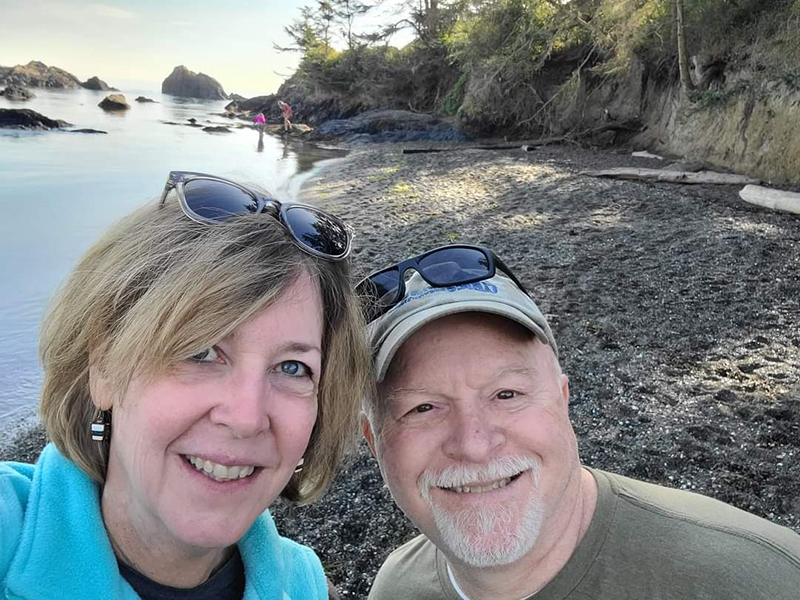Get Involved
Your knowledge, experience and expertise can help students thrive. From supporting them as they decide to come to SCSU to mentoring them as they navigate their next career step.
Dr. Lisa Fournier has had a storied career in business, leadership and education. Now an MBA career and leadership development coach with St. Cloud State University, she has been everything from a business founder and chief operating officer, to an implementer, consultant and professor.
She started her first business while still in college at 19 years old — an imprinted sportswear company where she used screen printing and embroidery. She sold the company a little over a decade later, and during that time she also earned her master’s degree in project management.
“I went on to work for several emerging growth companies, and I was an implementer — if you want to call me that. Basically, they usually have already come up with whatever their idea is. They've raised some investment capital, they're trying to get to market quickly because they have the resources, so they usually need help with actually getting it off the ground,” she said. “They're really good at that part, and then I would go in and help do the strategy and execute on the plan, mobilize teams, things like that.”
Fournier continued in that type of work for about another decade, and started a part-time consulting practice startup where she would help entrepreneurs develop strategy and leadership skills. At the end of the 2000s, however, Fournier became a full-time caregiver to her parents seemingly overnight; her mother had Alzheimer’s while her stepfather had congestive heart failure. She was focused on caregiving full time before her husband encouraged Fournier to pursue her doctorate, which she completed online while still caring for her parents. After finishing her doctorate in strategic leadership and after her mother entered into a long-term care facility, Fournier opened another business.
 “We coined it a ‘learning lab for entrepreneurs’ and it helped them to develop entrepreneurial skills — (for) nascent entrepreneurs, so people that had never had a startup. I had a real working store environment, so they could learn things like how to sell, how to close deals, how to have high customer service, how to work systems,” she said. “It was kind of an interesting time, because most people think about business like, ‘Oh, I need to make money and do these things,’ and I was having people come in and kind of break my business. So it was a learning lab. It was a community based business.”
“We coined it a ‘learning lab for entrepreneurs’ and it helped them to develop entrepreneurial skills — (for) nascent entrepreneurs, so people that had never had a startup. I had a real working store environment, so they could learn things like how to sell, how to close deals, how to have high customer service, how to work systems,” she said. “It was kind of an interesting time, because most people think about business like, ‘Oh, I need to make money and do these things,’ and I was having people come in and kind of break my business. So it was a learning lab. It was a community based business.”
While operating that business, Fournier got a contract with Old Dominion University in Virginia through a grant from the Department of Labor to help the underserved marketplace surrounding the area.
“The area we lived in had a high unemployment rate, like 10-plus percent. So I was helping to instill entrepreneurial mindsets and things in these real, working learning labs, I guess you could say. I also ran classes and had my first foray into learning at that point,” she said. “Concurrently, I also took up an adjunct job at a university. Virginia Tech contacted me and asked if I wanted to put in their first social entrepreneurship class because I had written a book on benefit corporations, which was a new type of entity structure at that point.”
Fournier then sold her learning lab business and moved closer to Virginia Tech. When her mother passed away in 2017 after years in long-term care, Fournier decided to pursue a master’s degree in dementia and aging.
“I’m one of those people that, if you've been through it, you should do something with it. Pay it forward, I guess you could call it. A lot of people who are caregivers, especially those with Alzheimer's disease, you will hear from them and they're like, ‘Why didn't I know? Why didn't they tell me what's going on?’” she said. “Alzheimer's Association does try to fill in some of those answers, but it's the hardest job anybody will ever do. Anybody who’s been a caregiver, I suspect, would tell you that. So I had volunteered for the Alzheimer's Association, again paying it forward, and then I decided to go back to school. I mean, I'm in academia, so why not get another degree?”
While working on that master’s degree, she ended up working on a federal Geriatrics Workforce Enhancement Program grant through the University of Southern Indiana. She helped put together a smart home set up for a dementia-friendly community, ultimately applying for a $50,000 award to help put together an artificial intelligence solution. The AI solution essentially helped people living with dementia navigate sundowning-type problems, presenting them with their favorite music or pictures to put them in a different frame of mind.
 While finishing her master’s she also taught at a couple different universities. After having to process multiple deaths in her family in a shorter span of time, Fournier said she needed to take time and step back in order to heal. She started writing a book to help in her grieving process.
While finishing her master’s she also taught at a couple different universities. After having to process multiple deaths in her family in a shorter span of time, Fournier said she needed to take time and step back in order to heal. She started writing a book to help in her grieving process.
In 2022 Fournier started looking for the next step in her career. She saw a posting for a part-time MBA career coach through SCSU.
“I’d never been a coach before, but I like to initiate things. That's what I do; I get things off the ground. Give me a blank canvas and leave me alone and I can go to town on that with people in collaboration. So I reflected on it, though, and they needed somebody to also teach a class in MBA programs and I’d been doing that, so I had that going on and I was good with that,” she said. “I thought about it, though, and I realized the one thread through my entire career was I have always assisted in whatever form that is for people get from A to B. Whatever that is for them — whether it was mentoring entrepreneurs, whether it was way back in the day when I had that first business and people who worked for me, who were all college students, were going through college and helping them figure out what career, career advice-type stuff.”
After joining SCSU, Fournier started researching best practices for MBA programs and coaching methods.
“I help with careers, but it's more on the ‘who am I and where am I going?’ And in fact, my engagement surveys, the two key terms that came up over and over was that coaching gave them clarity and focus. That's big. I don't want to take a client and say they're like a product, but it's kind of like taking a product to market; you position the product in the marketplace,” she said. “I do that piece of the client really better understanding self and then defining that vision. But that is coaching, and then you help to be that catalyst of helping them grow toward that so they gain their own confidence in their own competency. Coaching is unique. It's not therapy. Therapy is here, looking backwards. Coaching is here, looking forwards. It's not mentoring, which is like, ‘Let me tell you a story about a time when I was in your shoes,’ you know, it's more that way. It's not consulting, which is, ‘Here's how you can go about it.’ It's coaching.”
While Fournier is a fully remote faculty member, she said that seems to work seamlessly with her students’ schedules. As most of them are already in the workforce and some have families of their own as they pursue their MBAs, the flexibility of being able to connect with Fournier at different times and to connect virtually is a benefit for them. What each student is looking to gain from the coaching sessions varies.
“Coaching is reflective. So if you were to say something to me, I would just restate it back to you differently, but still within the same context and then check in with you to see if that resonated. There's a whole nuance on coaching that does that. I don't have to be an expert in their lives, and in fact we say that: ‘You're an expert of your life. You're an expert in what you do.’ It’s really around being an active listener and then reflecting back and asking incredibly good prompting questions to help them reflect,” she said. “I think it's really helping catalyze that ball. Sometimes you know the outcome is that they got a job, which is what they showed up for. Other times their work-life balance got squared away. Other times they just needed a stepping stone.”
Fournier’s coaching plan usually lasts three to four months, all in six to eight sessions of 45 minutes each. Sometimes, though, it just depends on who she’s working with.
“Coaching is coaching is coaching. It's not athletic coaching; that's important to know. I don't have a playbook,” she said. “Each person is unique and they’re their own person and I genuinely try to enter into their world of understanding for our session time.”
Even as a fully remote faculty member, Fournier said she has been able to see what’s special about SCSU through the students she works with.
“From the MBA students I see, they've got a drive to achieve, a drive to be better, a drive to go further in their lives. Also touching to me is not only the resilience, it's really defining their ‘what's next?’” she said. “I think St. Cloud State tries to really work on a culture that honors that.”
Your knowledge, experience and expertise can help students thrive. From supporting them as they decide to come to SCSU to mentoring them as they navigate their next career step.
Keep up-to-date with the latest news and research from the University, connect with local alumni and attend events, workshops and seminars.
Whether you are making a difference in your community, bringing about change to your industry or shaping the lives of those around you. We want to hear from you.